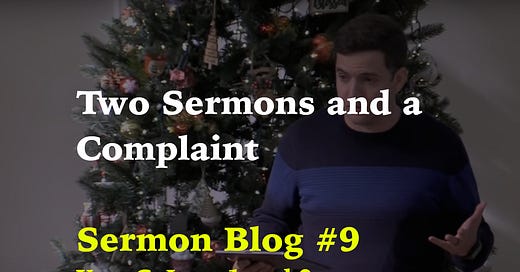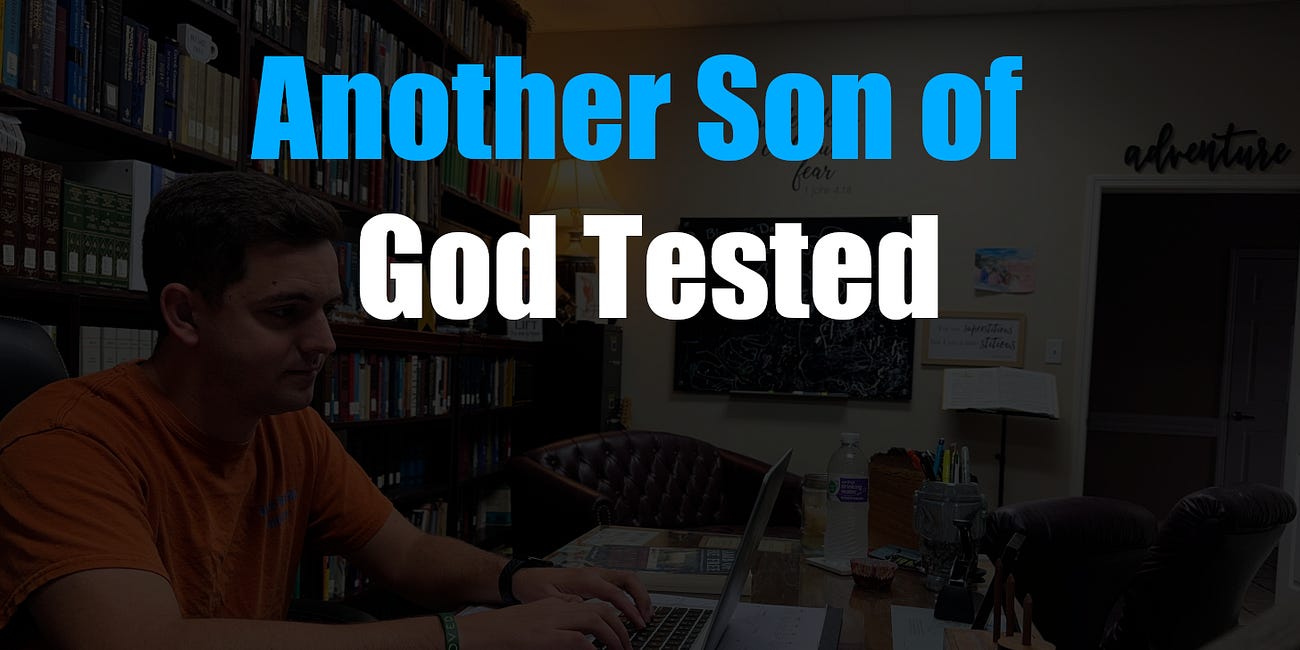But first, the complaint.
Ever since I started posting my sermons to YouTube, the process was the same: edit the length within YouTube Studio then export the clip as a new video. Well, for some reason, YouTube removed that feature. Now you can only save edits to the actual video.
This means if I were to clip the video down to the sermon part, it would take away all of the songs, communion talk, and any announcements.
So now I have to download the hour long stream, clip it, process it, then reupload it.
First world problems, I know, but that takes about 30-45 minutes longer than the previous method when you count the download, upload, and processing times.
Thanks for your time. You can bill my insurance.
Sermon—March 9, 2025 || Year C: First Sunday of Lent
Sermon Text
Another Son of God Tested
Jesus entered into our darkness, our delusion, our troubles, our pain, our trials—all to show us who God actually is. God is love, God is patient, God is kind. God is with us, and God is for us. Where was God in the storm? Where was God in the wildfire? Where was God in the cancer wing? He felt the wind, he smelled of smoke, and the marks from the IVs c…
Video
Reflection/ Creative Process
This sermon was hard. I knew I had something decent, but it lacked a sort of punch I was looking for, what Rob Bell calls the “existential urgency.”
When I was running late in the week, the sermon began to take a new shape in my mind.
The end of Luke 3 and the beginning of Luke 4 started to merge together: Adam, son of God, Jesus…
In the sermon text below, you’ll see I already made that connection; it’s been a margin note in my Bible since 2017 or so based on my Logos notes, but I hadn’t fit that connection in to this new web of thinking I was introduced to in the fall of last year when my friend Kyler recommended a Baxter Kruger interview to me. I think it was this one.
Anyway, enjoy the video, and remember the key takeaway: if you can’t figure out your thesis statement to a paper, the punchline to a joke, or the existential urgency of a sermon, then go outside and move around for a bit. It seems to work for me.
Sermon—March 16, 2025 || Year C: Second Sunday of Lent
Sermon Text
A Lament for ___________
I’ve seen a post floating around over the last few years that wonders aloud what kind of letter Paul would send the churches in the United States. I’ve got one for you that hits a little harder. If Jesus was standing over our city, country, church, etc. what words of lament would he cry out over us as he faced our inevitable rejection of his Way?
Video
Reflection
This sermon was something else.
Part of me felt a little vindictive in some way, but my friends assured me that wasn’t my tone. I tried to frame the sermon as a lament. A lament for religious division, a lament for division in general, and a lament for the legalism, literalism, and fundamentalism that fosters that division.
These feelings of lament came from an unfortunate experience I had earlier that week when I was reintroduced to a way of think that I had naively hoped had dissipated. Message me if you’d like to know what that was. These feelings of sadness, anger, and disbelief, which is the recipe for lament, were fueled by another situation I was made aware of later in the week. Again, I’d be happy to tell you about that privately if you just have to know.
The réponse to the sermon has been great, though. I didn’t expect anything negative, but I also didn’t expect the overwhelmingly positive response I received, so that was great.
I’ll talk more about the contents below.
Creative Process
So this one is definitely different from the one linked above. Keep in mind I had written the sermon above before the two things I mentioned in the reflection happened. As I pondered those situations, I kept coming back to something I have been harping on for several years: the fruit of the Spirit is really all that matters. If our faith is expressing itself in love, then we are on the right track no matter what anyone else thinks.
To show that, I decided to walk through the book of Galatians with the congregation.
If you were raised in the Churches of Christ, you may be familiar with how some use Galatians 1:6-10. A passage that warns against adding to the gospel is used to condemn anything that the preacher doesn’t like: instruments, fellowship buildings, paid preachers, Sunday school, etc. In other words, the people who use this text to condemn others end up condemning themselves by violating what this text is teaching.
What is this text teaching?
Jesus + ______ = bad news.
If you want free handouts on Galatians I wrote a few years ago, click here:
From there, everything falls into place. The book practically teaches itself.
I just riffed off of select passages I had in mind over the weekend. I picked a few out on the fly mid sermon with the plan on making it to Galatians 5 to discuss faith, love, and the fruit of the Spirit.






